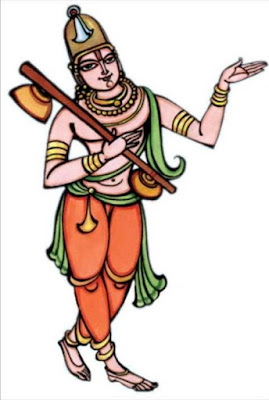annamācārya viracita bhāvayāmi gopālabālam
bhāvayāmi gopālabālaṃ manassevitaṃ tatpadaṃ cintayehaṃ sadā ||
kaṭighaṭita mekhalā khacitamaṇighaṇṭikā paṭalaninadena vibhrājamānam |
kuṭilapadaghaṭita saṇkulaśiñjitena tam | chaṭulanaṭanasamujjvalavilāsam ||
niratakarakalitanavanītaṃ brahmādisuranikarabhāvanāśobhitapadam |
tiruveṅkaṭācalasthitaṃ anupamaṃ harim | paramapuruṣaṃ gopālabālam ||
Re-ordered Word-by-word Meaning
bhāvayāmi gopālabālaṃ manassevitaṃ - I adore that cowherd boy, who is worshippable in my mind itself. (i.e. no need for elaborate physical worship).
ahaṃ sadā tatpadaṃ cintaye - (and thus) I constantly meditate on His feet.
(His description follows):
taṃ vibhrājamānam - (I meditate on) Him, who is resplendent, with
khacitamaṇighaṇṭikā mekhalā kaṭighaṭitā paṭalaninadena -
a belt tied round His waist, which is studded with gems, and tinkling bells; and by the rustle of the upper cloth, the bells are making a sound.
chaṭulanaṭanasamujjvalavilāsam - (I meditate on Him) who is engaged in totally captivating and charming play,
kuṭilapadaghaṭita saṇkulaśiñjitena - as He takes unsteady little steps (as a small boy) which occasion the soft sounding of his anklets,
niratakarakalitanavanītaṃ - (I meditate on Him) who is busy playing and eating butter filling his tender palms,
brahmādisuranikarabhāvanāśobhitapadam - and Lo! This tender boy's feet are luminous from the impassioned worship of gods, starting with Brahma himself!
anupamaṃ harim tiruveṅkaṭācalasthitaṃ - (I meditate on Him), Lord Hari/Vishnu, who is incomparable in glory, and is established atop the holy Venkatachala,
paramapuruṣaṃ gopālabālam - and who is the Supreme Lord, and yet is accessible to me as this tender cowherd boy, Krishna!
This prayer of Annamacharya has been immortalised in song by Smt. M. S. Subbulakshmi, and her song has been rendered by many many singers of late. I heard her sing this in 1980/81 at Rama Seva Mandali, and was simply blown away by the sweetness of the tune, the words, and the way Smt. Radha accompanied her.
This text of the original words is based on iterative research, as no ready resources are free from mistakes. Anyway I am sure of the text as I have translated here. It has to be, in terms of the Sanskrit language, cintayehaṃ, and not cintayeyaṃ, as was sung. The reason is that the poet is already in prayer (present tense, and has no need to suggest that he would like to pray in some hypothetical time (the optative verb form means that).
